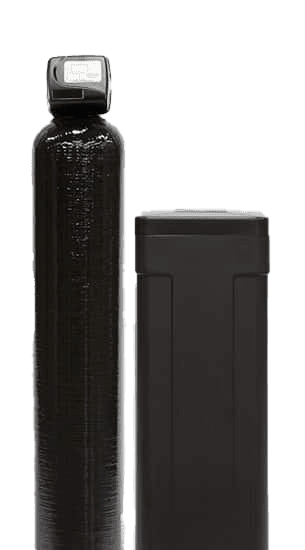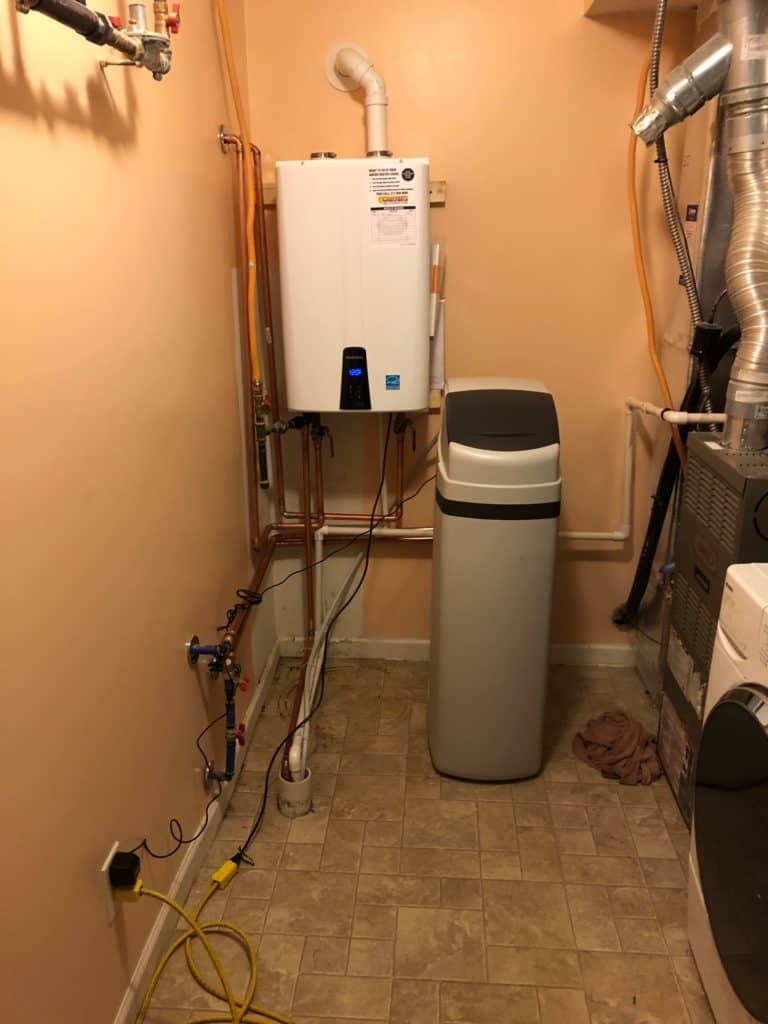Table of Contents
How Much Will The Water Softener Installation Cost?
(2025 Update) The average cost of Indianapolis water softener installation is about $1250 to $2,700 for standard model water softeners and homes that are already plumbed. Many homes are not “pre-plumbed” so there may be additional costs such as cutting the wall, patching, sweating the copper, etc. In these situations, extra time is required, which may increase the price. *Prices vary based on the complexity of the circumstances.
If you live in a community that has hard, mineral-rich water, investing in a water softener may seem like a no-brainer. Indeed, a water softener can provide a host of benefits, extending the life of your appliances and plumbing systems, promoting healthy skin, even making it easier to clean your clothing.
Of course, there is one thing every homeowner will want to know when it comes to water softener installation: How much is it going to cost?
As you can probably imagine, the cost to install a water softener can vary wildly from one home to the next, depending on a number of different factors. Nationwide, the cost of installing a water softener can range from $500 to $6,000. Thankfully, for homeowners in the Indianapolis area, the average cost is much closer to the lower end of the spectrum.
Note that a plumbing company like Carter’s My Plumber will provide a free estimate based on the scope of work required.
What are the Factors That Impact Water Softener Installation Expenses?
Before you have your water softener installed, you’ll naturally want to consult with an experienced plumber. A seasoned plumbing company will be able to provide you with a recommendation for the type of water softener you need for your home, as well as the water supply capacity. Based on this information, your plumber will be able to furnish you a more personalized cost estimate.
This estimate will encompass a wide range of variables, any number of which can have a dramatic impact on the total cost of your water softener. Some of these factors include:
The Type of System
When it comes to water softener systems, there are basically five types:
- Ion exchangers, which use salt and brine
- Water distillation systems
- Salt-free systems
- Reverse osmosis water softeners
- Magnetic water softener systems
Your plumber will be able to give you more information about how each type of system works, as well as a price estimate for each.
The Size of Your System
Water softeners also come in different capacities. Larger capacities are needed for larger homes or larger households. And, typically, larger-sized systems will be a bit more expensive, as well.
The Size of Your Home
It’s not just the size of the water softener system that matters. The scale of your home is also a critical factor. Simply put, a house that has more square footage (and more bathrooms) is going to require more plumbing than a one-bedroom apartment. Larger homes will typically need more water treated each day, to accommodate daily use. So, working with your plumber, you’ll need to estimate the amount of water you’ll need to be treated each day, using a unit known as grains per gallon.
If you want to do some quick math to figure out the grain capacity you require in your home, here are some quick instructions:
- The average person uses about 90 gallons of water each day. So, take the number of people who live in your home and multiple that number by 90.
- Multiply that sum based on the water hardness level, which should be readily available from your local municipality.
These calculations will give you a general ballpark of the grain capacity you need for your water softener system. And again, that will directly impact the total installation cost.
The Part of Your Home Being Served
Something else to consider: If you feel intimidated by the idea of installing a whole-house water softening system, you may wish to consider having a smaller unit installed under the sink, furnishing soft water for just one or two rooms. For example, you may decide that you only need a water softener in the kitchen and/or bathrooms. Smaller water softeners are quite inexpensive, often costing little more than $100. And because they can be installed in just half an hour or so, your plumber’s labor costs shouldn’t be too burdensome, either.
Labor and Installation Costs
Whether you choose to get a whole-house system or an under-the-sink model, you’ll need to account for the unit itself as well as the labor costs of your plumbing company. Naturally, labor costs will be higher for more complicated projects, including installations in older homes where brand new pipes might be required. All in all, you may be looking at anywhere from $150 to $600 for labor expenses.
As an aside, make sure you seek a plumbing company that will provide you with clear, up-front pricing, allowing you to budget for your water softener installation and not encounter any unwanted surprises.
Your Geographic Location
You should also be aware that the cost to install a water softener can vary depending on where you live. While this isn’t an ironclad rule, it’s generally true that plumbing labor and material costs are higher in urban areas, and a bit less expensive in rural areas. This has to do with trends in cost of living, as well as the level of demand for plumbing services.

Are There Any Additional Costs to Owning a Water Softener?
We’ve covered a number of the factors that can influence the installation cost of a water softener. In addition to these upfront costs, homeowners should be prepared for some potential maintenance and upkeep costs down the road, and for the duration of their water softener’s lifespan. Here are a few examples of the types of ongoing costs you should anticipate if you desire to have a water softener installed:
The Cost of Maintaining a Water Softener
A water softener is a complicated system, requiring a number of moving parts in order to get the job done. In order to ensure that your water heater is performing properly, ongoing maintenance is recommended. The specifics can vary depending on the type of water softener you have. For example, if you have a salt-based water softener, you will need to clean out the brine tank every few months. You may also need to have a technician come out to replace the salt or potassium, or to flush the system as needed. On average, the annual cost of maintaining a water softener is around $100 to $300.
The Cost of Water Testing
Another additional cost to account for is the cost of water testing. Simply put, you’ll need to know the current state of your water if you know what kind of water softener system you should get. In some situations, your local municipality will be able to supply the recent water tests they have performed on your behalf. It never hurts to ask! If your municipality cannot find a recent water test, then you may need to hire a water treatment specialist to come check your water hardness level, pH, mineral content, and more.
Electrical and Plumbing Costs
If you decide to have a water softener installed for your whole house, you’ll need to have it placed somewhere close to the water main. In some homes, this is pretty simple and straightforward. In other homes, it may be more difficult to access the water main, which may lead to your plumbing company installing some new piping. If this is the case, you can anticipate a pretty steep increase in your total installation cost.
Likewise, water softener systems need power. If there’s no easily-accessible power nearby, you’ll need to hire an electrician to help you out. Again, this can cause installation costs to rise pretty substantially. That’s something to talk about with your plumber during the initial consultation.
The Cost of Hiring a General Contractor
Most of the time, hiring a general contractor is not required to have a water softener installed. However, there may be some situations in which your home requires substantive, structural changes in order for the new plumbing lines and/or electrical wiring to function properly. If you do need to have major structural work done, that may necessitate the oversight of a general contractor. Typically, this will cause the overall cost of the project to rise by roughly 20 to 25 percent.
Permit and Inspection Costs
For more major home improvement projects, including the most major water softener installation endeavors, it may be mandatory that you get permits and/or inspections from municipal authorities. As you can probably imagine, there will be some fees involved. Check with your plumber in advance to see whether permits or inspections are needed for your project.

Is a Water Softener Worth It?
Clearly, there are a number of factors that may cause a water softener installation to balloon… though it’s worth reiterating that the average cost is $1,200, which is not too extreme. Still, homeowners have every right to wonder: Is having a water softener actually worth the investment?
The answer to that depends on a number of factors, including the hardness level of your water and the way that it affects water usage in your household. For some homeowners, installing a water softener may not be a wise investment at all. However, a water softener can help you avoid a number of common issues, any one of which can prove expensive to address on its own. In other words, if you are experiencing any of the following problems, installing a water softener may be a shrewd financial investment:
You’re Getting Bad Water Testing Results
If you have a suspicion that your water source is contaminated with a high concentration of water minerals, you may want to go ahead and have it tested. You can hire a professional to assess your water quality, or you can simply buy a water tester at a local hardware store. (These often cost as little as $10, though of course, price ranges can vary.)
Most water test kits will deliver results in a unit known as milligrams per liter of dissolved calcium carbonate. Ideally, you want that number to be somewhere between 0 and 60; if so, you really don’t need softened water at all. By contrast, if you get a reading of 121 or higher, that means your water is pretty hard, and it’s probably taking a real toll on your pipes. To avoid premature plumbing failure, investing in a water softener may be a wise investment.
You’re Experiencing Staining
Hard water can cause staining, which may be evident in your sink basin, your bathtub, or even your toilet bowl. Basically, as water recedes down the drain, it can leave mineral deposits behind. These mineral deposits can produce stains that are very hard to remove. In fact, they are often hard and rock-like. A water softening system can prevent this from happening. So, if it’s something that is causing ongoing damage or staining to your plumbing fixtures, you may decide that installing a water softener is a good use of your resources.
You’ve Noticed Scale Buildup
In addition to staining, there is a related phenomenon called scaling, which happens as a result of some of those same water-bound minerals. Basically, minerals known as limescale, or just scale, can accumulate on your dishes, silverware, showerheads, and any other surface that comes into contact with untreated water. Note that if you’re seeing scale buildup on coffee cups and plates, it’s definitely happening inside appliances and pipes, too. All of this scale buildup can cause major problems, potentially resulting in major plumbing breakdowns and costly repair needs. Getting a water softener can actually be a smart, cost-effective way to avoid all of this.
Your Utility Bills Have Gone Up
Believe it or not, hard water can actually lead to a notable increase in your monthly utility costs. This can be attributed to mineral buildup in your pipes, forcing your water to push harder just to provide you with a decent level of flow. If this is the case, then getting a water softener can perhaps save you some money in the long run.
You’re Experiencing Laundry Issues
Another problem that you may encounter due to hard water is faded laundry. This occurs because hard water interferes with detergents, rendering them unable to clean clothes quite as effectively. If you notice that your clothing has faded, or that it appears gray or frayed around the edges, it may be related to mineral content in your water. Consider a water softener, which can help you keep your clothes looking fresh and new.
You are Experiencing Personal Health Problems
Hard water is bad for your pipes, it’s bad for your appliances, it’s even bad for your clothes… but don’t overlook the fact that hard water takes a toll on your personal health, as well. Specifically, hard water may damage your hair, or cause your scalp to be itchy, flaky, and dry. What’s more, hard water may make it more challenging to rinse and dissolve the soap on your body, potentially leading to nasty residues. If you’re experiencing skin or hair problems as a result of hard water, the investment in a water softening system may be 100 percent worth it.
You Experience Water Heater Woes
Again, it’s important to remember that if you’re seeing a scummy mineral build-up in one place, it’s probably happening throughout your plumbing system. Your water heater is no exception. Indeed, hard water can lead to the premature failure of your water heating system, which means you may need to pay for a new heater sooner rather than later. The minimum cost of this will likely exceed $1,000, so investing in magnetic systems or osmosis systems for softening your water can be a worthwhile investment indeed.

Should I Pay for Professional Installation or Try DIY Installation?
As homeowners consider the cost of installing a water softener, it may be tempting to explore DIY installation. But is this really a smart move?
If you are fairly handy, have patience to learn a new type of plumbing equipment, and are only looking to install a small under-sink water softener, then going the DIY route may be worth entertaining.
For homeowners who are looking to install whole-house units, including ion exchange systems or reverse osmosis systems, we really recommend working with a professional plumbing company. From choosing the right type of softener to handling all the plumbing and electrical work involved, this is a big job, and any mistakes may call for extensive repairs… causing the actual cost of installation to balloon. This is to say nothing of potential safety issues involved with major home improvement projects.
All told, you may actually save money, save headache and hassle, and get a better outcome by seeking expert advice and professional installation.
Why Get a Water Softener in Indianapolis, IN?
The bottom line? Many homeowners in the Indianapolis area have hard water, which can impair their quality of life in a number of ways. While water softeners represent a sizable up-front investment, they can also pay off in myriad ways. Some of the primary benefits include:
- Softer, healthier skin and hair
- More efficient use of cleaning products
- Extended lifespan and improved performance for appliances
- Extended lifespan for pipes and plumbing systems
- Extended lifespan and quality for your clothing
To learn more about having a water softening system installed in the Indianapolis, IN community, make sure you seek out a professional plumbing company. Consider Carter’s My Plumber, a family-owned company with decades of experience. We can assist with salt-free softeners and other options for water softeners. Additionally, we are here to assist with other plumbing projects and plumbing issues that may arise, including cleaning out mineral buildup in pipes. For 24/7 emergency service, contact us directly.



